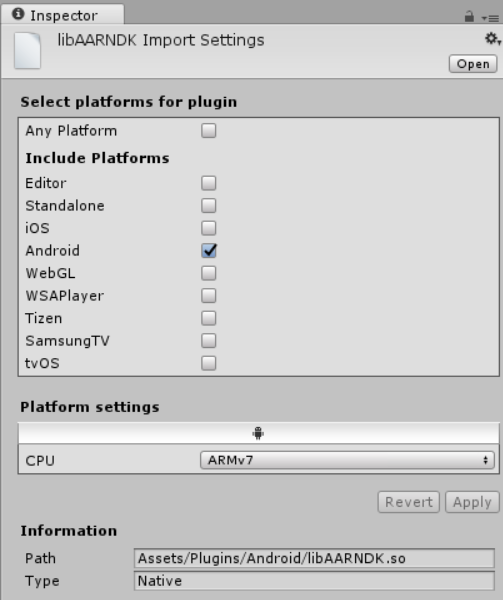- Unity User Manual 2020.2
- Platform development
- Android
- Building and using plug-ins for Android
- Plug-ins #Native (C ++) para Android
Plug-ins #Native (C ++) para Android
Unity supports native plug-ins for Android written in C/C++ and packaged in a shared library (.so) or a static library (.a). When using the IL2CPP scripting backend, you can use C/C++ source files as plug-ins and Unity compiles them along with IL2CPP generated files. This includes all C/C++ source files with extensions .c, .cc, .cpp and .h.
To build a C++ plug-in for Android, use the Android NDK and get yourself familiar with the steps required to build a shared library. The same applies to static libraries.
If you are using C++ to implement the plug-in, you must ensure the methods are declared with C linkage to avoid name mangling issues. By default, only the C source files that have a .c file extension in the plug-ins have C linkage (not C++).
extern "C" {
float Foopluginmethod ();
}
After building the library, copy the output .so file(s) into your Unity project. In the Inspector, mark your .so files as compatible with Android, and set the required CPU architecture in the dropdown box:

Para llamar a los métodos en su plug-in nativo desde sus scripts C #, use el siguiente código:
[DllImport ("pluginName")]
private static extern float Foopluginmethod();
Tenga en cuenta que pluginName no debe incluir el prefijo (‘lib’) o la extensión (‘.so’) del nombre del archivo. Se recomienda ajustar todas las llamadas al método nativo de plug-in con una capa de código C # adicional. Este código comprueba [Application.platform](../ScriptReference/ Application-platform.html) y llama a métodos nativos solo cuando la aplicación se ejecuta en el dispositivo real; los valores ficticios se devuelven desde el código C # cuando se ejecuta en el Editor. Use plataforma define para controlar la compilación de código dependiente de la plataforma.
When you use C/C++ source files as plug-ins, you call them from C# in the same way except that you use __Internal for plug-in name, for example:
[DllImport ("__Internal")]
private static extern float Foopluginmethod();
Native (C++) plug-in Sample
The AndroidNativePlugin.unitypackage zip file contains a simple example of a native code plug-in distributed as Unity package.
The sample shows how to invoke C++ code from a Unity application. The package includes a scene which displays the sum of two values as calculated by the native plug-in. To compile the plug-in must install the Android NDK.
To install the sample:
- Download the the zip file.
- Extract the AndroidNativePlugin.unitypackage file.
- Open the Unity Editor.
- Create a new Project.
- In the new project click Assets > Import Package > Custom Package.
- In the Import Package file dialog, navigate to the location in which you extracted the file and select it.
- 2018–12–21 Page amended
- 2018–03–10 Page published
- Updated features in 5.5
- Support for using C++ source files and static libraries as plug-ins on Android added in 2018.2 NewIn20182